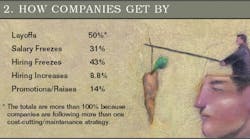The first part of our 13th annual Salary Survey appeared in the June issue of Control and is readable on the web at:
Since the day God punished Adam and Eve by forcing them to earn a living "by the sweat of their brows," humans have had a love/hate relationship with their work. When its going well, it can leave one feeling like what one novelist described as "God on the seventh day." When its not, well, it stinks.
In process control, as in most jobs, its usually a combination of the two. Our 2003 job survey shows 70% of the respondents are either "very" or "fairly" satisfied with their jobs (Figure 1). They think control engineering is "a blast" and "a great profession."
They love the challenge and the chance for hands-on playing with the machinery. A Minnesota-based design and construction engineer with 10-plus years experience working in the metals industry goes so far as to suggest that "if youre not having fun, youre doing something wrong."
But there is a dark undercurrent running through the comments in this survey. Our readers are more worried about their jobs than they have been in past years. They are deeply concerned about the shrinking manufacturing base in the U.S. They are stressed out by the pressures of their jobs and frustrated by their particular work situations. They feel over-worked and under-appreciated.
A surprising number of those surveyed, when asked what advice they would give to a young person entering engineering, said, "Dont." Alternatives ranged from starting your own business to becoming a doctor, lawyer, or missionary to the homeless,anything, apparently, but engineering.
Livin Lean
While the economists are telling us the recession is over, it sure doesnt feel that way in the process manufacturing industries. The respondents to our survey tell us their employers are still holding tight to the purse strings and cutting staff where they can. Figure 2 shows how companies are responding to the continuing weakness in the economy.
Given this situation, our readers are a bit less secure about their job prospects than they were last year. The twitchiness factor is up 6 percentage points, as 45% fear losing their jobs (Figure 3).
One chemical engineer tells us, "Business conditions are such that layoffs are possible. Many departments have already reduced head counts." A young chemical engineer in pulp and paper is already wishing he could work in an "environment where there arent constant threats of layoffs . . . so you dont feel like you have to constantly search for a more stable job."
A 40-something electrical engineer from New York state puts it succinctly: "An engineer is a commodity that is bought and sold. Laws of supply and demand work very strongly in the field, and job security is not on the corporate radar."
Others echo the sentiments, saying their companies [or their industry verticals] are "struggling to survive" and sharing their fears that older workers will be laid off in favor of younger, cheaper ones.
The wage slaves arent the only ones who are worried. A Georgia-based independent engineer complains that "Contracts are getting hard to find. Jobs are taking less time to complete and the time between contracts is longer." Another employee of an independent engineering firm tells us, "The downturn in the economy has put our office in the red the last two quarters, and this one doesnt look good either."
Maybe Things Arent So Bad
But for the happy few, the scenery is very different.
A maintenance engineer in his late 50s tells, "Maintenance engineering supports the facility, which is essential as part of our daily operation; therefore job security is not a major issue."
An engineer for a wastewater equipment supplier in Wisconsin says, "We are too busy. Job security is not an issue. New products are being added all the time."
Some engineers are both sanguine about their prospects and entrepreneurial in nature. "Job security in not a concern because it is my responsibility, not the company I work for," says an engineer at a West Virginia chemical company.
Others plan to get by with a little help from their Higher Power. "The Lord provided me with this job and will take care of me if I lose it," says an Alabama-based engineer working in utilities.
Even if things in the control job market are a little dicey at the moment, some folks see real opportunity in the not-too-distant future. A Texas-based chemical engineer in his late 50s points out, "We run a very lean and efficient organization. This means we dont hire talented but inexperienced young engineers and operators. As a result, 45% of this facilitys personnel are over 50."
A somewhat younger colleague (37-45) from Oklahoma adds, "I can foresee a time in the near future when there will be a lack of experienced control engineers. Many of my colleagues will retire in five years."
Security Isnt Everything; Neither is Money
Being relatively sure there wont be a pink slip in the pay envelope isnt the only thing keeping our readers showing up for work in the morning. Neither is the amount in the packet. Perhaps not surprisingly, engineers love a challenge (Figure 4).
Job satisfaction varies from vertical to vertical. The industries that are struggling the most,textiles, pulp and paper, mining,have some of the lowest job satisfaction numbers,no surprise there. One surprise to us was the relatively high "Disappointed" score in pharmaceuticals,15%. This vertical is being touted as one of the "hot" industries of the coming years.
And, for all the talk about being entrepreneurial and the advantages of working for smaller firms, independent engineering firms scored almost as badly as the beleaguered textile industry in terms of having the most "disappointed" engineers.
The Day-to-Day Stuff
What one does every day also matters in terms of satisfaction. Our survey numbers tell us: 1. Its good to be the king; 87% of corporate managers are either "very" or "fairly" satisfied with their jobs; and 2. Its better to be the quality control guru. 89% of them are either very or fairly satisfied with their jobs.
On the other hand, 11% of production/plant operations engineers are "disappointed" in their jobs, followed closely by the folks in engineering design and construction at 10%. In R & D, nobody actually hates their work, but only 53% are either very or somewhat satisfied by it.
Pet Peeves
Two complaints that were not specifically covered in our survey popped up again and again in the "Additional Comments" section. Production and plant operations and plant maintenance engineers found the 24/7, always-on-call nature of their jobs stressful and wearing.
A 50-something chemical engineer from New York wants "fewer hours and fewer interruptions at home during the off hours." A production and plant operations guy from South Carolina, when asked what one thing he would change about his job, cited the "24-hours-a-day responsibility." A plant maintenance engineer from Ohio with more than 10 years experience says, "24/7 operation wears on you over the years."
The other gripe is paperwork. Many of those responding to our survey think theres way too much of it. Getting rid of it was often the one thing our respondents wanted to change about their jobs.
Attention, HR Dept.
A double-E from Oregon with 7-10 years in process control told us: "[Process control engineering] can be a great job and very rewarding, but working for the wrong employer can be hell." Accordingly, we asked our readers to rate the companies they work for on several factors: compensation, fun, excitement, challenge, life/work balance, growth opportunities, performance review procedures, wise use of employee resources and employee retention. The scale is the usual 0 (low) to 5 (high).
The section of our survey that graded the quality of life at the workplace provides some interesting numbers,not all of which will please the folks in the executive suite. Based on our survey, only 42% of our sample gave compensation (pay and benefits) a 4 or 5 score. Fortunately another 36% gave their companies a 3 score for pay and benefits, leaving only 17% of those surveyed really unhappy about their pay stubs.
At the same time, many control engineers are underwhelmed by other factors in their work environments. The only category that scored better than 50% in the 4 and 5 categories was "challenge." The combined 4-5 score was 58%. Fortunately, based on the comments we received, challenge is one of the things many engineers like most about their jobs.
The "fun" and "excitement" factors were evenly split. One-third of those surveyed gave the fun factor at their company a 4 or a 5. Slightly more (35%), said there was hardly any fun at all at their companies and gave them 1s or 2s. Similarly, 29% of those surveyed gave their companies a 4 or 5 for providing and exciting work environment, but 33% said their companies were pretty boring and gave them only a 1 or 2.
Companies could use some work on providing a better work/life balance, according to our readers, 38% of which gave their companies a 3 in this category. Fours and 5s combined for a total of 30%, but only 5.4% scored a 5.
These numbers are supported by the number of comments from our readers complaining that they were working too hard or putting in too many hours or traveling too much. Nevertheless, 50% got either three or four weeks vacation, 35% got flex time and 82% reported working no more than 50 hours a week.
Perhaps more disturbing to the folks in HR is the fact 26% of our readers said their companies scored only a 1 in terms of providing opportunities for growth. Only 5.3% scored a 5. These numbers may reflect the suspicion on the part of many of those surveyed that their vertical in particular and manufacturing in general are doomed in the U.S.
The worst scores were in the categories of performance review procedures and wise use of resources. These scored cumulative 1 and 2 scores of 55% and 53%, respectively. Only 3.9% of those surveyed thought their company had top-notch review procedures, and only 2.8% gave their companies top scores for using resources wisely.
More encouraging was the 47% who rated their companies as 4s or 5s in terms of employee retention, although how much of that can be attributed to the dodgy job market is unknown.
One of the few women who responded to our survey,a 30-something Texas-based electrical engineer working in engineering design and construction at a pharmaceutical manufacturer,delivered a caveat to those hiring,or interested in keeping,control engineers. "There is a shortage of qualified engineers," she says. "The ones that are qualified are not afraid to get another job. Provide the environment to get the work done and we will stay. Otherwise, adios!"
A Thankless Task
One undercurrent running through many of the comments we received was management does not appreciate what their engineers do or reward them sufficiently,even in terms of soft benefits such as an "attaboy." The following is excerpted from a letter attached to one of our surveys.
"I am a purchasing agent for the maintenance department [of an Iowa meat processing company]. In only one year I managed to save the company $112,000. I put in a lot of time and hard work in making up a crib, dealing with vendors, and fighting with the people that didnt like the change of being on a budget, checking out parts, and doing PM work orders and inventory control. On the week following my review, I received a 3% increase. I have never seen a company that cares [so little] about maintenance and what I did.
"A couple of weeks ago we had a visit from Corporate. They didnt even make an effort to check out this department. [I was told] âthey didnt care and it didnt matter to him."
The writer asked us if we had any advice for dealing with the situation. Any suggestions?




